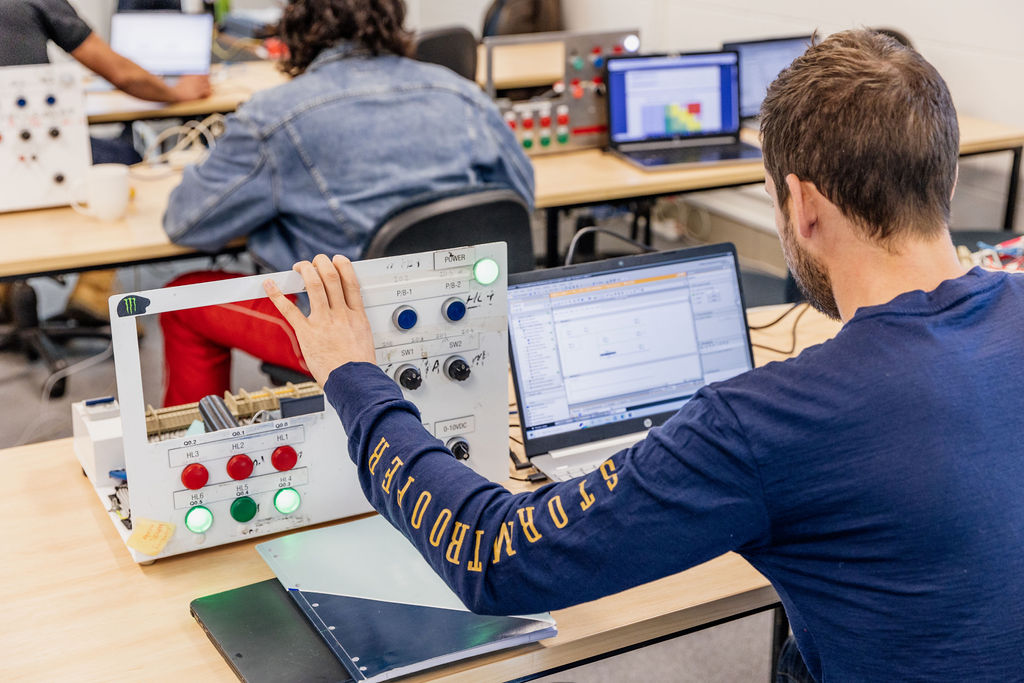Electrotechnology is an ever-evolving technical industry that includes installing, servicing, repairing, and maintaining electrical equipment for residences and commercial and industrial properties. Within electrotechnology is electrical instrumentation.
Electrical instrumentation primarily focuses on the measurement, automation and control of systems used to monitor and maintain temperature, pressure and flow in processes for industries such as mining, oil and gas, food and manufacturing.
Studying electrotechnology courses in this skill will help you become more successful in fields like data communication, home automation, renewable energy, intelligent systems, and facilities management.
What is Electrotechnology?
Electrotechnology is the overall phrase describing how electricity functions in the modern world, as well as the science behind electrical systems.
What Work Does Electrotechnology Include?
Electrotechnology allows people to design, install, maintain, and fix electrical systems and equipment. A career in electrotechnology may include working in different industry sectors. You can find current industry forecasts of skills for electrotechnology on the National Industry Insights website.
Many students who complete courses in electrotechnology become electricians, but there are also possible paths into construction, manufacturing, and telecommunications. As such, workers in this area may also work across several other industries, which may include mining, renewables, air conditioning, and domestic and commercial cooling systems.
Opportunity growth in electrotechnology
According to the National Industry Insights from the Australian Industry and Skills Committee, or AISC, the top five in-demand occupations are:
- electricians
- electronics trades workers
- electrical engineering draftspersons and technicians
- air conditioning and refrigeration mechanics
- telecommunications trades workers
Developing packaged home automation systems has impacted consumer behaviour, enabling them to use mobile devices to check on and alter their electricity usage. This increase in widespread technology use creates new opportunities in the Electrotechnology industry.
Likewise, the government continues to promote clean energy and renewable technology; projects all over Australia include hydro to store energy, wind power, and phasing out hydrofluorocarbons to minimise emissions.
Careers and qualifications in electrotechnology
A career in electrotechnology holds high responsibility, which is why a sound understanding and experience are necessary to work in the field. Because of this, practising electrotechnology in Australia requires completing relevant electrotechnology courses, as well as hands-on experience.
Undertaking electrotechnology qualifications help interested people pursue careers in fields like electrical instrumentation, giving students a complete study of the ways that circuits function, installing low voltage systems where relevant, and troubleshooting issues with their equipment and electrical systems too.
Depending on the state or territory in which you choose to work, there may be additional requirements to work in electrotechnology, like a Queensland electrical license.
Studying an Electrotechnology Certificate in Australia
Advanced Australian institutions like EIM Training in Queensland offer electrotechnology courses that range from cert IIIs, which may take 12 months to complete, to diplomas which could take 24 and include practical components.
Although you can study electrotechnology courses internationally, some more advanced classes, like a Diploma of Electrical and Instrumentation, will include practical, hands-on teaching on-campus.
What is Electrical Instrumentation?
Electrical instrumentation is a subfield of electrotechnology that deals with measuring variables and managing equipment for automated control.
What Does an Electrical Instrumentation Technician Do?
What is an electrical instrumentation technician? Such engineers measure process variables, such as temperature and pressure, by using equipment or measuring components to manipulate them. They ensure the proper functioning of automated equipment and use devices to record data.
Many electrical instrumentation technicians work for manufacturing plants, but an electrical instrumentation course may provide skills valuable to many different industries and career paths.
Career opportunities in electrical instrumentation
The electrical services sector is one of the largest in Australia, incorporating a range of sub-fields, such as electronic, electrical, communication, and instrumentation technologies. In addition, the digital age is ushering in an unprecedented demand for electricians who have training in instrumentation, telecommunications, security, information technology, and electronic control systems.
Australia’s increasing demand for new technologies, renewable energy, and automation requires more electricians and engineers than ever before. Some of the most in-demand skills in the country include cybersecurity, data analytics, and digital literacy, allowing technicians to translate data into meaningful information.
How to Start a Career in Electrotechnology and Electrical Instrumentation
At EIM Training, we’re proud to provide comprehensive electrotechnology courses to both domestic and international students.
EIM is Australia’s leading RTO for domestic students, and our experienced and certified instructors attend to our extensive curriculum with precision and accuracy, supplying you with the skills and knowledge needed to transition into or remain successful in the broad field of electrotechnology, and to specialise in instrumentation and control.
Our broad range of courses offers something for everyone. We can assist you to become an instrumentation technician or furnish you with further knowledge of all the current electrical developments. So, if you require a qualification upgrade, or are totally new to the electrotechnology field – be it apprentice, entry-level, corporate worker or more – we can help you with our flexible study and recognition of prior learning options.
At EIM Training, we understand what is required for success within this sector but more importantly how to achieve it. If you’re considering a career in electrical instrumentation or something else within electrotechnology, feel free to contact us or begin your course enquiry to find steps to help you achieve your goals.




